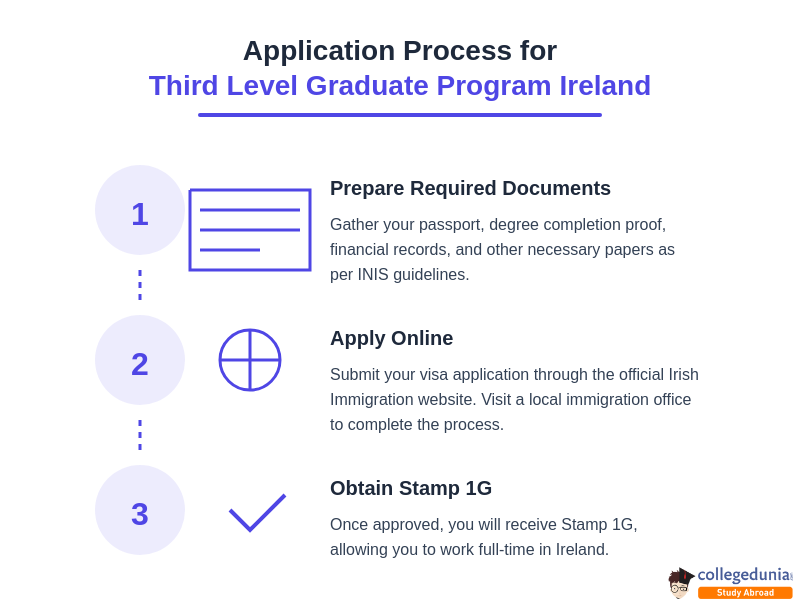Shahid Mustaq Murshed Study Abroad Content Specialist
Study Abroad Content Specialist
Ireland has become a popular destination for international students, in part due to the post-study work opportunities available after graduation. The "stay back" option allows graduates to remain in Ireland to seek employment and build their careers. After completing your studies, Ireland offers the Third Level Graduate Program Scheme, allowing non-EU/EEA graduates to remain in the country to seek employment. The duration of this stay depends on your qualification level:
- Level 8 (Honours Bachelor's Degree): Eligible for a 12-month stay-back period.
- Level 9 or above (Master's and Doctoral Degrees): Eligible for up to 24 months.
During your stay-back period in Ireland, you can work full-time (up to 40 hours per week) without needing a separate work permit.
As per the ‘First Destination of Graduates’ reports*, from the Higher Education Authority (HEA) of Ireland, here are some of the quick statistics of international graduates of 2023 in Ireland.
- 13,819 international graduates (51.9% female, 48.1% male).
- The most popular fields are Business, Administration, and Law (34.7%).
- 9 months post-graduation employment rate was 75.3% in 2023 (down from 79.7% in 2022).
- 7.7% of students opted for further studies in 2023 (down from 8.8% in 2022).
- Top employers were Schools, HSE, Ernst & Young, and Deloitte.
- Recruitment sites (24.2%) were the most popular source for international students to find jobs in Ireland.
*Note: This is the latest graduate student report published by HEA, Ireland on 19 December 2024.
Eligibility Requirement for Ireland Stay Back for International Students
To be eligible for the Third Level Graduate Program, students generally must meet the following criteria:
- Possess a valid Stamp 2 student visa and a current immigration registration card.
- Ensure their total stay as a non-EEA student does not exceed seven years.
- Complete a program listed on the Interim List of Eligible Programs (ILEP) in Ireland.
- Obtain at least a Level 8 qualification (Honors bachelor’s degree or higher) from a recognized Irish University.
- Be legally residing in Ireland at the time of application.
- Apply for the Third-Level Graduate Scheme within 6 months of receiving official confirmation of their degree.
- Maintain a clean immigration record and comply with all Irish laws.
Application Process for Ireland Stay Back Option
The process to apply for a stay back option for international students in Ireland from India is mentioned below:
- Prepare Required Documents: Gather your passport, degree completion proof, financial records, and other necessary papers as per the Irish Naturalization and Immigration Service (INIS) guidelines.
- Apply Online: Submit your visa application through the official Irish Immigration website. After applying, visit a local immigration office to complete the process and obtain your immigration stamp.
- Obtain Stamp 1G: Once approved, you will receive Stamp 1G, allowing you to work full-time in Ireland.

Know More: Ireland Work Visa- A Complete Guide
Work Opportunities and Long-Term Residency in Ireland
Ireland's job market is attractive to graduates, particularly in the service sector. Key industries include Information and Communication Technology (ICT), education, healthcare, business services, and finance. The average monthly net salary (after tax) is 2,991.01 EURO in Ireland. After the post-study stay-back period, graduates can pursue long-term work permits like the Critical Skills Employment Permit or the General Employment Permit.
Critical Skills Employment Permit
Designed to attract highly skilled individuals in sectors experiencing shortages, such as ICT, engineering, and healthcare. To qualify, you must have a job offer with a minimum salary of 38,000 EURO for designated occupations and possess relevant qualifications.
General Employment Permit
Covers a broader range of occupations. Applicants need a job offer with a minimum annual salary of 30,000 EURO and must meet specific criteria, including a Labour Market Needs Test in certain cases.
Additional Information on Ireland PSW for International Students
Check out the additional information on post-study work visas or Ireland PSW for international students given below:
- The processing time for the Ireland PSW visa is 2-4 weeks.
- Graduates must apply for the visa within 6 months of receiving their final results.
- The stay-back option is an automatic entitlement included in the student visa.
- Students can work full-time, up to 40 hours per week, during their stay-back period.
- Approximately 70% of graduates from Irish public universities are employed shortly after graduation, with about 60% finding work within Ireland.
After 5 years of legal residency on employment permits, you may be eligible to apply for long-term residency in Ireland, granting extended rights and stability. This is a significant step toward permanent residency and reflects a commitment to building your career in Ireland.
FAQs
Ques: Is there a stay-back option in Ireland for international students?
Ans: Yes! Ireland offers a stay-back option under the Third-Level Graduate Scheme, allowing international students to stay and work in Ireland after completing their studies.
Ques: What is the 24-month stay-back option in Ireland?
Ans: Master’s (Level 9) graduates can stay in Ireland for up to 24 months under the Third-Level Graduate Scheme, giving them time to find a job and apply for a work permit.
Ques: Can I get Ireland PR in 2 years?
Ans: Not directly. To apply for permanent residency (PR), you usually need to live and work in Ireland for at least 5 years on a valid work permit. However, Critical Skills Employment Permit holders can apply for a Stamp 4 (PR pathway) after just 2 years.
Ques: How much bank balance is required for an Ireland student visa?
Ans: You need to show proof of at least €10,000 in your bank account to cover living expenses for the first year in Ireland.



Comments